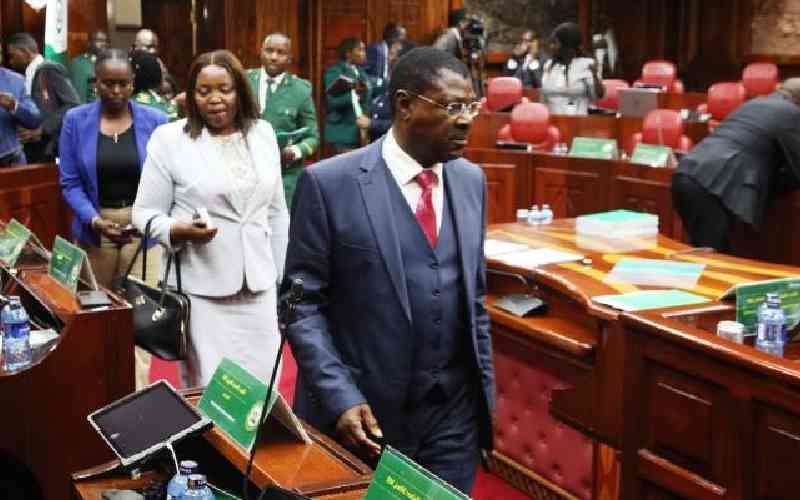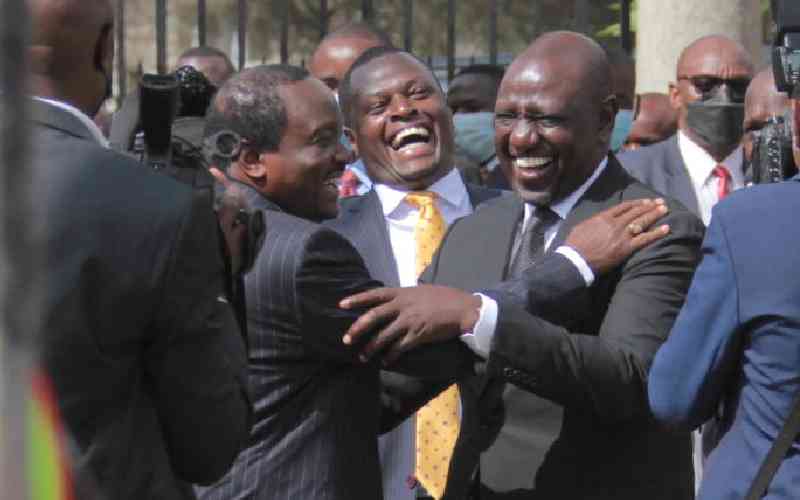In 2010, Kenyans adopted a new Constitution with the desire to redefine the relationship between citizen and State and a restructuring of the architecture of government. We felt particularly compelled to vote in a new constitution because of how power and authority under the old dispensation had been abused.
In almost four decades of implementing the independence Constitution, numerous ‘infamous’ amendments were made, most of which watered down the supreme law of the land and concentrated power in the executive branch of government. For instance, recall that in the early days of the post-independence era, at the stroke of a pen Kenya switched from a federalist to a centralised state. Two decades thereafter, in similar fashion, democracy was shelved and Kenya officially became a one party state.
And so in an effort to run away from this malpractice, which had set a bad precedent for governance, the framers of the 2010 Constitution, vowing to prevent the tyranny of institutions put in place a robust system of checks and balances to limit the concentration of power in any one branch. Moreover, the Committee of Experts also delineated the exact powers and functions of each institution.
In the spirit of balance of power, the Constitution therefore envisages a Parliament that has an oversight role over the executive. Similarly, the Judiciary is empowered to review laws and decisions that Parliament enacts as well as offer advisory opinions when called upon. Moreover, this institution is required to deliver justice to all parties and hold institutions in check. The constitution is the supreme law of the land, as the three branches execute their mandates, they should view that the Constitution as a broad framework that outlines general principles for governance. And this is because the Constitution cannot read like a piece of legislation, it cannot dictate what is supposed to take place at every turn, rather, it provides direction.
Indeed, the articles of the Constitution express codified principles and precepts that must be adhered to, but accompanied with every written constitution are un-codified conventions, customs, practices and procedures that institutions of the State follow.
These constitutional norms emerge to assist the branches of government in executing their functions; their primary purpose to ensure smooth sailing implementation of mandates.
Kenya is at a new beginning with a Constitution that demands new standards, customs and practices and therefore requires the emergence of a new constitutional culture. An examination of the emerging trend is worrisome. In recent times, when the three branches of government have engaged with one another, there is hostility, defiance and contempt shown to the other.
There is complete disregard to the spirit and principles of the Constitution. Sometimes, institutions go so far as openly defying the law. Instead, an abrasive, chest-thumping, defiant trend has emerged. We must take a step back and remember that although three independent and distinct institutions, accountability towards each other is implied. Above all, there has to be a respect for the rule of law.
A few days ago, the National Assembly of Kenya defied a court order to halt the impeachment proceedings against the embattled Cabinet Secretary for Devolution and Planning Anne Waiguru. This is simply a flagrant violation of the law, let alone poor constitutional practice. Kenya is a nation governed under the rule of law, not discretion and as such a court order cannot be defied. In a mature democracy, the National Assembly would have appealed this decision in court while exploring other mechanisms to keep dialogue open between the conflicting institutions. The National Assembly is setting a bad precedent by inviting and encouraging anarchy. The last time Kenyan’s disregarded the Judiciary, post-election violence followed; this culture must not be encouraged.
No institution should feel the need to assert its powers and stamp its authority without regard of precedent and future implications for governance and practice. As was once said by the Canadian scholar Peter Hogg, the purpose of conventions is to prescribe the way in which legal powers shall be exercised. They are not cast in stone but they are usually adhered to because they set good precedent and form a firm foundation for cooperation and stable government.
So how do we get back on track towards proper constitutionalism? To start with, the law is sacrosanct, and the rule of law MUST be adhered to. Never is an institution supposed to succumb to political expediency as the National Assembly is currently doing. Political expediency ruins the practice of fair and credible governance practices.
To do so is to revert to the constitutional practices of the Kenyan post-independence era. Secondly, the channels of communication amongst the three branches must remain open, information amongst top-level bureaucrats must flow openly; independence should not be construed as strict because the arms must work in harmony. Thirdly, a culture of negotiation and compromise has to be encouraged, in order to reduce the hostility witnessed whenever the three branches engage.
Finally, it is also incumbent upon the heads of our three branches to offer prudent leadership especially in guiding the working relations of the different arms. Rather than clash all the time, consultation and cooperation amongst the three branches would be more useful for a harmonious, stable and progressive Government.
 The Standard Group Plc is a
multi-media organization with investments in media platforms spanning newspaper
print operations, television, radio broadcasting, digital and online services. The
Standard Group is recognized as a leading multi-media house in Kenya with a key
influence in matters of national and international interest.
The Standard Group Plc is a
multi-media organization with investments in media platforms spanning newspaper
print operations, television, radio broadcasting, digital and online services. The
Standard Group is recognized as a leading multi-media house in Kenya with a key
influence in matters of national and international interest.
 The Standard Group Plc is a
multi-media organization with investments in media platforms spanning newspaper
print operations, television, radio broadcasting, digital and online services. The
Standard Group is recognized as a leading multi-media house in Kenya with a key
influence in matters of national and international interest.
The Standard Group Plc is a
multi-media organization with investments in media platforms spanning newspaper
print operations, television, radio broadcasting, digital and online services. The
Standard Group is recognized as a leading multi-media house in Kenya with a key
influence in matters of national and international interest.








